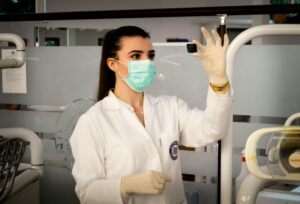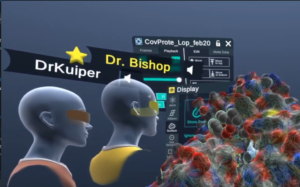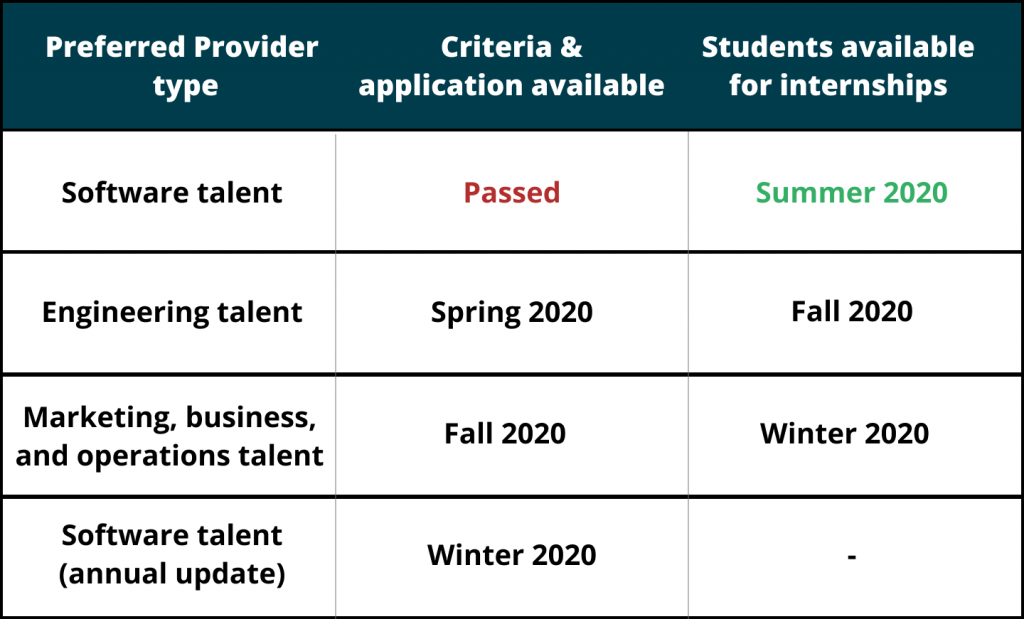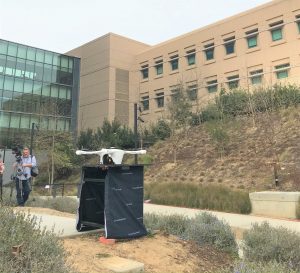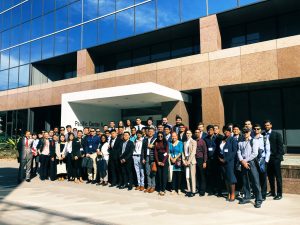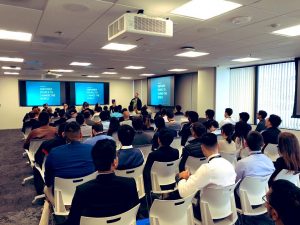Employers select seven ‘Preferred Providers’ to supply qualified software engineering talent for first internship cohort
San Diego – As a way to broaden and diversify San Diego’s talent pipeline, Advancing San Diego – a program led by San Diego Regional EDC – will provide up to 100 San Diego-based companies with fully-funded internships. Advancing San Diego internships are available to companies with fewer than 100 employees looking for better access to STEM talent to develop inclusive opportunities for all students. Companies can apply here.
“If we want to grow our regional economy, we must remove barriers that small companies face in accessing qualified workers,” said Nikia Clarke, vice president of economic development at San Diego Regional EDC. “Today, 73% of San Diego’s job growth is going to come from small businesses, yet our research has shown that many of these companies don’t have the time or money to invest in recruiting skilled-talent. We’ve flipped the traditional workforce development model on its head: employers tell us the skills they need, we identify the educational programs – Preferred Providers – that do the best job providing those skills , and then we use our talent development fund to create pathways for San Diegans into quality jobs in the companies that need them most.”
The Advancing San Diego program is helping the region achieve its inclusive growth goals. To ensure future competitiveness, San Diego must double the production of local workers with in-demand degrees or credentials by 2030. Achieving this goal requires collaboration between public and private sectors – educators and employers – as well as a focus on equity and inclusion. Better alignment of industry and education systems means that institutions can more effectively prepare San Diegans from all backgrounds for high-demand jobs and employers can establish and expand recruitment relationships with locally-serving institutions.
In its first round of internships, Advancing San Diego will place software engineering talent who will soon be followed by cohorts of interns with backgrounds in general engineering, and marketing/operations.
Applying for Advancing San Diego: How it works
Advancing San Diego will fully subsidize the cost of interns for more than 100 small companies in San Diego, with priority for companies in STEM industries that are poised for high growth in coming years. Once a company certifies it meets eligibility requirements, the company will ‘apply’ to Advancing San Diego.
Advancing San Diego has also hired a staffing partner that will coordinate interviews, scheduling, and placement, and who will serve as a resource for the interns throughout their duration of the internship.
In addition to providing each intern with a wage of $16.50 an hour, each intern will be eligible for up to $500 to be used on miscellaneous expenses including transportation to the internship site, wardrobe, training services and more.
As part of the first software engineering cohort, Advancing San Diego interns will be sourced from Preferred Providers – programs recognized by employers for providing the skills and training necessary for students to pursue jobs or internships in software engineering positions. Students from Preferred Provider programs will come from diverse backgrounds and will be at varying stages of their education journey. Each Preferred Provider was evaluated against a skills-based criteria for entry-level software engineers that was created by employers.
Software Engineering Preferred Providers:
- CSU San Marcos – Computer Science Department
- Mesa College – Computer and Information Science Department
- MiraCosta College – Computer Science Department
- San Diego Code School – Full Stack JS Apprenticeship Program
- San Diego State University – Computer Science Department
- UC San Diego – Jacobs School of Engineering
- UC San Diego Extension
Advancing San Diego will facilitate the placement of students from these programs into jobs or internships with selected companies.
Understanding Advancing San Diego
In 2019, San Diego was one of five cities to receive a $3 million investment as part of JPMorgan Chase’s AdvancingCities Challenge, an initiative to drive inclusive growth and create greater economic opportunity across the U.S.
“JPMorgan Chase firmly believes in San Diego’s legacy of collaboration. That’s why we’ve invested in Advancing San Diego knowing that our community partners will work closely together with small businesses and higher education to ensure San Diego’s future competitiveness,” said Aaron Ryan, San Diego regional leader for middle market banking at JPMorgan Chase. “By developing advanced workforce skills and providing pathways to the jobs of the future, San Diego’s brightest citizens and businesses will be equipped for success for years to come.”
Advancing San Diego is a collaborative effort to address skilled talent shortages and increase diversity in high-growth, high demand jobs. This effort aligns economic development, workforce development, educational systems and industry around a set of common goals: increase completions of degrees and credentials for high-demand jobs and provide pathways to placements in those jobs for San Diegans. Advancing San Diego collects and communicates employer’s talent needs, identifies education programs providing top-quality training and covers the cost of internships for students of those programs in small companies.
To learn more about Advancing San Diego, visit advancingSD.org.
To apply to host a fully-funded software engineering intern, apply here.
About San Diego Regional EDC
San Diego Regional EDC mobilizes business, government and civic leaders around an inclusive economic development strategy in order to connect data to decision making, maximize regional prosperity, enhance global competitiveness, and position San Diego effectively for investment and talent. sandiegobusiness.org
###
Media Contact
Sarah Lubeck, San Diego Regional EDC
sl@sandiegobusiness.org | 619.361.1437
Download a copy of the release


